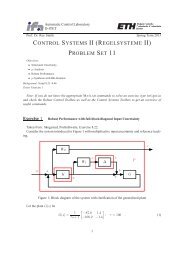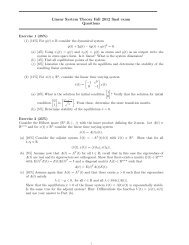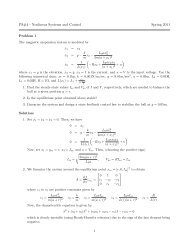- Page 1:
Predictive Control for linear and h
- Page 4 and 5:
ii Preface Dynamic optimization has
- Page 6 and 7:
iv book, in Chapter 3 we introduce
- Page 8 and 9:
vi Acknowledgements Large part of t
- Page 10 and 11:
viii Contents III Optimal Control 1
- Page 12 and 13:
x Contents Symbols and Acronyms Log
- Page 14 and 15:
xii Contents Dynamical Systems x(k)
- Page 17 and 18:
Chapter 1 Main Concepts In this Cha
- Page 19 and 20:
1.1 Optimization Problems 5 Active,
- Page 21 and 22:
1.2 Convexity 7 Operations preservi
- Page 23 and 24:
Chapter 2 Optimality Conditions 2.1
- Page 25 and 26:
2.2 Lagrange Duality Theory 11 wher
- Page 27 and 28:
2.3 Complementary Slackness 13 Note
- Page 29 and 30:
2.4 Karush-Kuhn-Tucker Conditions 1
- Page 31 and 32:
2.4 Karush-Kuhn-Tucker Conditions 1
- Page 33 and 34:
Chapter 3 Polyhedra, Polytopes and
- Page 35 and 36:
3.2 Polyhedra Definitions and Repre
- Page 37 and 38:
3.2 Polyhedra Definitions and Repre
- Page 39 and 40:
3.3 Polytopal Complexes 25 Definiti
- Page 41 and 42:
3.4 Basic Operations on Polytopes 2
- Page 43 and 44:
3.4 Basic Operations on Polytopes 2
- Page 45 and 46:
3.4 Basic Operations on Polytopes 3
- Page 47 and 48:
3.4 Basic Operations on Polytopes 3
- Page 49 and 50:
3.4 Basic Operations on Polytopes 3
- Page 51 and 52:
3.5 Operations on P-collections 37
- Page 53 and 54:
3.5 Operations on P-collections 39
- Page 55 and 56:
3.5 Operations on P-collections 41
- Page 57 and 58:
3.5 Operations on P-collections 43
- Page 59 and 60:
Chapter 4 Linear and Quadratic Opti
- Page 61 and 62:
4.1 Linear Programming 47 4.1.2 Dua
- Page 63 and 64:
4.1 Linear Programming 49 x2 c =
- Page 65 and 66:
4.1 Linear Programming 51 J(z) 6 5
- Page 67 and 68:
4.2 Quadratic Programming 53 0.5z
- Page 69 and 70:
4.3 Mixed-Integer Optimization 55 A
- Page 71 and 72:
4.3 Mixed-Integer Optimization 57 4
- Page 73:
Part II Multiparametric Programming
- Page 76 and 77:
62 5 General Results for Multiparam
- Page 78 and 79:
64 5 General Results for Multiparam
- Page 80 and 81:
66 5 General Results for Multiparam
- Page 82 and 83:
68 5 General Results for Multiparam
- Page 84 and 85:
70 5 General Results for Multiparam
- Page 86 and 87:
72 5 General Results for Multiparam
- Page 88 and 89:
74 6 Multiparametric Programming: a
- Page 90 and 91:
76 6 Multiparametric Programming: a
- Page 92 and 93:
78 6 Multiparametric Programming: a
- Page 94 and 95:
80 6 Multiparametric Programming: a
- Page 96 and 97:
82 6 Multiparametric Programming: a
- Page 98 and 99:
84 6 Multiparametric Programming: a
- Page 100 and 101:
86 6 Multiparametric Programming: a
- Page 102 and 103:
88 6 Multiparametric Programming: a
- Page 104 and 105:
90 6 Multiparametric Programming: a
- Page 106 and 107:
92 6 Multiparametric Programming: a
- Page 108 and 109:
94 6 Multiparametric Programming: a
- Page 110 and 111:
96 6 Multiparametric Programming: a
- Page 112 and 113:
98 6 Multiparametric Programming: a
- Page 114 and 115:
100 6 Multiparametric Programming:
- Page 116 and 117:
102 6 Multiparametric Programming:
- Page 118 and 119:
104 6 Multiparametric Programming:
- Page 120 and 121:
106 6 Multiparametric Programming:
- Page 122 and 123:
108 6 Multiparametric Programming:
- Page 124 and 125:
110 6 Multiparametric Programming:
- Page 126 and 127:
112 6 Multiparametric Programming:
- Page 128 and 129:
114 6 Multiparametric Programming:
- Page 131 and 132:
Chapter 7 General Formulation and D
- Page 133 and 134:
7.2 Solution via Batch Approach 119
- Page 135 and 136:
7.3 Solution via Recursive Approach
- Page 137 and 138:
7.4 Optimal Control Problem with In
- Page 139 and 140:
7.4 Optimal Control Problem with In
- Page 141 and 142:
7.5 Lyapunov Stability 127 - asympt
- Page 143 and 144:
7.5 Lyapunov Stability 129 where x(
- Page 145 and 146:
7.5 Lyapunov Stability 131 An effec
- Page 147 and 148:
Chapter 8 Linear Quadratic Optimal
- Page 149 and 150:
8.2 Solution via Recursive Approach
- Page 151 and 152:
8.4 Infinite Horizon Problem 137 As
- Page 153 and 154:
8.5 Stability of the Infinite Horiz
- Page 155 and 156:
Chapter 9 1/∞ Norm Optimal Contro
- Page 157 and 158:
9.1 Solution via Batch Approach 143
- Page 159 and 160: 9.2 Solution via Recursive Approach
- Page 161 and 162: 9.4 Infinite Horizon Problem 147 wh
- Page 163 and 164: 9.4 Infinite Horizon Problem 149 wi
- Page 165: Part IV Constrained Optimal Control
- Page 168 and 169: 154 10 Constrained Optimal Control
- Page 170 and 171: 156 10 Constrained Optimal Control
- Page 172 and 173: 158 10 Constrained Optimal Control
- Page 174 and 175: 160 10 Constrained Optimal Control
- Page 176 and 177: 162 10 Constrained Optimal Control
- Page 178 and 179: 164 10 Constrained Optimal Control
- Page 180 and 181: 166 10 Constrained Optimal Control
- Page 182 and 183: 168 10 Constrained Optimal Control
- Page 184 and 185: 170 10 Constrained Optimal Control
- Page 186 and 187: 172 10 Constrained Optimal Control
- Page 188 and 189: 174 10 Constrained Optimal Control
- Page 190 and 191: 176 10 Constrained Optimal Control
- Page 192 and 193: 178 10 Constrained Optimal Control
- Page 194 and 195: 180 10 Constrained Optimal Control
- Page 196 and 197: 182 10 Constrained Optimal Control
- Page 198 and 199: 184 10 Constrained Optimal Control
- Page 200 and 201: 186 10 Constrained Optimal Control
- Page 202 and 203: 188 10 Constrained Optimal Control
- Page 204 and 205: 190 10 Constrained Optimal Control
- Page 206 and 207: 192 10 Constrained Optimal Control
- Page 208 and 209: 194 10 Constrained Optimal Control
- Page 212 and 213: 198 11 Receding Horizon Control the
- Page 214 and 215: 200 11 Receding Horizon Control and
- Page 216 and 217: 202 11 Receding Horizon Control wit
- Page 218 and 219: 204 11 Receding Horizon Control fun
- Page 220 and 221: 206 11 Receding Horizon Control (A1
- Page 222 and 223: 208 11 Receding Horizon Control Sta
- Page 224 and 225: 210 11 Receding Horizon Control and
- Page 226 and 227: 212 11 Receding Horizon Control the
- Page 228 and 229: 214 11 Receding Horizon Control set
- Page 230 and 231: 216 11 Receding Horizon Control A d
- Page 232 and 233: 218 11 Receding Horizon Control 11.
- Page 234 and 235: 220 11 Receding Horizon Control Rem
- Page 236 and 237: 222 11 Receding Horizon Control wit
- Page 238 and 239: 224 11 Receding Horizon Control Rem
- Page 240 and 241: 226 11 Receding Horizon Control the
- Page 242 and 243: 228 11 Receding Horizon Control x 2
- Page 244 and 245: 230 11 Receding Horizon Control x 2
- Page 246 and 247: 232 11 Receding Horizon Control
- Page 248 and 249: 234 12 Constrained Robust Optimal C
- Page 250 and 251: 236 12 Constrained Robust Optimal C
- Page 252 and 253: 238 12 Constrained Robust Optimal C
- Page 254 and 255: 240 12 Constrained Robust Optimal C
- Page 256 and 257: 242 12 Constrained Robust Optimal C
- Page 258 and 259: 244 12 Constrained Robust Optimal C
- Page 260 and 261:
246 12 Constrained Robust Optimal C
- Page 262 and 263:
248 12 Constrained Robust Optimal C
- Page 264 and 265:
250 12 Constrained Robust Optimal C
- Page 266 and 267:
252 12 Constrained Robust Optimal C
- Page 268 and 269:
254 12 Constrained Robust Optimal C
- Page 270 and 271:
256 12 Constrained Robust Optimal C
- Page 272 and 273:
258 12 Constrained Robust Optimal C
- Page 274 and 275:
260 12 Constrained Robust Optimal C
- Page 276 and 277:
262 12 Constrained Robust Optimal C
- Page 278 and 279:
264 12 Constrained Robust Optimal C
- Page 280 and 281:
266 12 Constrained Robust Optimal C
- Page 282 and 283:
268 13 On-line Control Computation
- Page 284 and 285:
270 13 On-line Control Computation
- Page 286 and 287:
272 13 On-line Control Computation
- Page 288 and 289:
274 13 On-line Control Computation
- Page 290 and 291:
276 13 On-line Control Computation
- Page 292 and 293:
278 13 On-line Control Computation
- Page 294 and 295:
280 13 On-line Control Computation
- Page 297 and 298:
Chapter 14 Models of Hybrid Systems
- Page 299 and 300:
14.2 Piecewise Affine Systems 285 X
- Page 301 and 302:
14.2 Piecewise Affine Systems 287 x
- Page 303 and 304:
14.2 Piecewise Affine Systems 289 k
- Page 305 and 306:
14.3 Discrete Hybrid Automata 291 A
- Page 307 and 308:
14.3 Discrete Hybrid Automata 293 e
- Page 309 and 310:
14.3 Discrete Hybrid Automata 295
- Page 311 and 312:
14.4 Logic and Mixed-Integer Inequa
- Page 313 and 314:
14.5 Mixed Logical Dynamical System
- Page 315 and 316:
14.7 The HYSDEL Modeling Language 3
- Page 317 and 318:
14.7 The HYSDEL Modeling Language 3
- Page 319 and 320:
14.7 The HYSDEL Modeling Language 3
- Page 321 and 322:
14.8 Literature Review 307 systems
- Page 323 and 324:
14.8 Literature Review 309 and allo
- Page 325 and 326:
Chapter 15 Optimal Control of Hybri
- Page 327 and 328:
15.1 Problem Formulation 313 Consid
- Page 329 and 330:
15.2 Properties of the State Feedba
- Page 331 and 332:
15.2 Properties of the State Feedba
- Page 333 and 334:
15.2 Properties of the State Feedba
- Page 335 and 336:
15.3 Properties of the State Feedba
- Page 337 and 338:
15.4 Computation of the Optimal Con
- Page 339 and 340:
15.6 State Feedback Solution via Re
- Page 341 and 342:
15.6 State Feedback Solution via Re
- Page 343 and 344:
15.6 State Feedback Solution via Re
- Page 345 and 346:
15.6 State Feedback Solution via Re
- Page 347 and 348:
15.6 State Feedback Solution via Re
- Page 349 and 350:
15.8 Receding Horizon Control 335 U
- Page 351 and 352:
15.8 Receding Horizon Control 337 x
- Page 353 and 354:
15.8 Receding Horizon Control 339 x
- Page 355 and 356:
References [1] L. Chisci A. Bempora
- Page 357 and 358:
References 343 [25] A. Bemporad. Re
- Page 359 and 360:
References 345 [52] F. Blanchini an
- Page 361 and 362:
References 347 [81] B. De Schutter
- Page 363 and 364:
References 349 [110] E. G. Gilbert
- Page 365 and 366:
References 351 [138] J.N. Hooker. L
- Page 367 and 368:
References 353 [164] M. Lazar, D. M
- Page 369 and 370:
References 355 [194] K. R. Muske an
- Page 371 and 372:
References 357 [222] M. Schechter.
- Page 373:
References 359 [249] R. Vidal, S. S





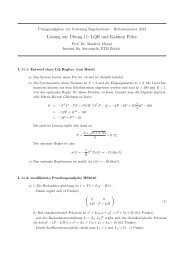
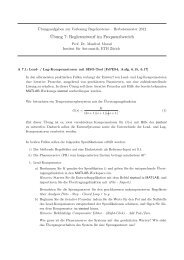



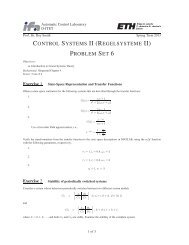
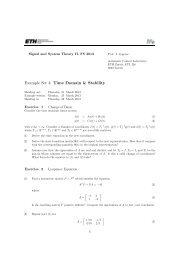

![Convex Optimization: [0.5ex] from Real-Time ... - ETH Zürich](https://img.yumpu.com/18678007/1/190x143/convex-optimization-05ex-from-real-time-eth-zurich.jpg?quality=85)

